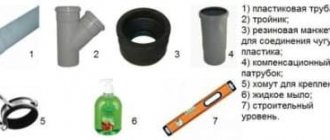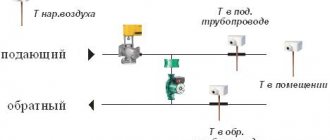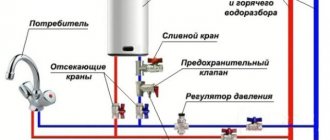The annual increase in service costs forces owners of residential property in multi-apartment buildings to think about how they can avoid paying for central heating services and switch to an alternative - individual heating.
Changing the centralized heating method to installing your own equipment will allow you to independently control temperature indicators and reduce cash costs.
Refusing heating is an action not prohibited by law, but before carrying it out you need to collect the necessary documents and comply with legal formalities.
Legislation
- The Housing Code of the Russian Federation defines the quality criteria for the provision of housing and communal services.
- Federal Law No. 190-FZ dated July 27, 2010 “On Heat Supply” establishes the rules of relations in the field of production, transmission, and consumption of thermal energy.
- Federal Law No. 416-FZ dated December 7, 2011 “On Water Supply and Water Disposal” regulates legal relations in the field of water resources provision, requirements for water quality and safety.
- Federal Law No. 2300-1 of 02/07/1993 “On the Protection of Consumer Rights” lists the rules of interaction between sellers (performers) and buyers.
- Decree of the Government of the Russian Federation dated May 6, 2011 No. 354 “On the provision of utility services to owners and users of residential premises in apartment buildings” names the criteria for the quality of utility resources, the procedure for their payment and provision, the responsibilities of the parties, and the practice of recalculation.
- Decree of the Government of the Russian Federation dated August 8, 2012 No. 808 “On the organization of heat supply” contains the rules for heating consumers.
Shutdown
Residents of apartment buildings want to disconnect from central heating for various reasons. The benefit of this solution is to reduce the cost of utility services. The law does not prohibit such changes, but it is not easy to do.
Is it possible to turn off the apartment's central heating?
If a single owner in an apartment building wants to turn off the heating, it is almost impossible to do so. The reason lies in the communications arrangement of residential buildings. The heat supply system is common to residents of all floors; it is connected through risers, pipelines, and meters. Disabling one element leads to a deterioration in the quality of the whole. To painlessly disconnect one apartment, a global redesign of the network is required. Building communications are property, the composition of which is determined by the owners and the management company.
Dear readers! To solve your problem right now, get a free consultation
— contact the lawyer on duty in the online chat on the right or call: +7 (499) 938 6124 — Moscow and region.
+7 (812) 425 6761 — St. Petersburg and region. 8 (800) 350 8362 - Other regions of the Russian Federation You will not need to waste your time and nerves
- an experienced lawyer will solve all your problems!
IMPORTANT! If the property is recognized as a common property, the decision to turn off the heating is discussed at a meeting of residents.
Here they also determine who and from what sources will pay for the redevelopment and approval of the new heat supply network. Since no one is interested in the extra costs and difficulties of restructuring the network, the decision will be negative.
In addition, regular non-payment of utility bills will work against the applicant. If there is a debt, the project will not be approved.
Is it possible to refuse to all residents of an apartment building?
It is possible for all residents to give up central heating. To do this, at a meeting of residents of the house, this issue must be put on the agenda. If the decision is made by the majority, then the procedure for drawing up and approving a new communications project begins. This looks like a renovation of a house's water circuit.
How to refuse according to the law of the Russian Federation
Disconnecting a home from central heating is a time-consuming and costly process. To do this correctly, it is necessary to comply with the requirements of the law and step by step go through the difficult stage of project approval.
List of questions needed to be resolved
To turn off the heating you must:
- gain the approval of neighbors;
- obtain permission for reconstruction;
- contact specialists to create a redevelopment project;
- agree on the project;
- collect a package of documents;
- technically implement the plan.
When deciding to switch to individual heating, you need to decide which one. Since clause 15 of Art. 14 of Federal Law No. 190 of July 27, 2010 “On Heat Supply” prohibits the transition to individual heating in an apartment building when using thermal energy sources, the list of which is approved by Government Decree.
Neighbor permissions
IMPORTANT! If the heating system is defined in technical documents as common property, then separating an apartment from it is considered a reduction in such property (Article 36 of the Housing Code of the Russian Federation).
In this case, the neighbors must allow the innovation; the issue is discussed at a meeting of residents.
When communications are not property of the house, the opinions of neighbors do not matter. You can immediately proceed to obtaining permission from relevant organizations. It will be necessary to make changes to the technical passport of the house.
Documentation
Article 26 of the Housing Code of the Russian Federation gives owners the right to disconnect from central communications. To do this, you need to collect a package of documents:
- Statement. It is written in free form; it needs to state the request to disconnect the apartment from centralized heating and justify it.
- Technical passport of the living space.
- Certificate of ownership.
- Written consent of adults living in the apartment.
- Conclusion on the technical feasibility of such changes.
- Coordinated reconstruction project.
Reconstruction project
The document on redevelopment of the heat supply of an apartment or house is carried out by a design organization or institute with the appropriate license on a contractual basis. To do this, use professional instructions and comply with the requirements of the law. Specialists will make calculations and monitor the effect of the apartment’s heating elements on the heating of the house.
Thermal-hydraulic calculations and calculations of residual heating from risers and sunbeds are also performed.
If, according to the results, installation of a separate boiler is possible, the project should be submitted for approval. If experts admit that canceling apartment heating will worsen the neighbors’ thermal conditions, it will not be possible to agree on the document.
Where to contact
Local government bodies - the administration of a city, town or district - are the authorities where you need to contact to obtain permission to reconstruct the heat supply system. These issues are dealt with by the department responsible for the use of housing stock. To do this, you need to provide there the collected documents and an application.
IMPORTANT! The redevelopment project is additionally coordinated with firefighters and the sanitary-epidemiological station.
After the project is approved and completed, it is necessary to invite utility services and draw up a statement stating that the service is no longer provided and there should be no charges for it.
Deadlines
The timing of the shutdown depends entirely on the wishes of the initiator, since the law places on his shoulders all the costs of re-equipping the heating system in his living space. He is also obliged to establish normal operation of the heat supply in adjacent apartments. Accordingly, the owner independently searches for project contractors, enters into an agreement with them and pays for the work. It is clear that the whole process should not occur during the heating season.
Debt collection for heating
Debt collection for housing and communal services is an integral part of the work of management companies, HOAs and RSOs. However, it is difficult to understand the nuances of the procedure on your own. Management companies, before using radical measures to turn off heating, are required to comply with the pre-trial format for resolving the dispute.
First of all, a notice of the presence of arrears is sent - as a rule, the text is indicated on the payment receipt. If there is no payment from the owner, a claim is filed.
In addition to the required details, the text of the document contains the following information:
- legal grounds for claims;
- legal consequences in the form of accrual of penalties in accordance with Article No. 155 of Part No. 14 of the Housing Code of Russia.
In this case, the debtor can react in different ways - ignoring, counterclaiming, complaining about the absence of batteries in the apartment, etc. In each situation, experts recommend consulting with a lawyer about the legality of the requirements of the Criminal Code or RSO.
But if the claim is legitimate, then the debt should be paid in order to avoid litigation, since by decision of the authorities the company has the right to forcibly collect the arrears.
Statute of limitations
An example of calculating heating fees according to PP 354.
When a debt collector goes to court against the owner of an apartment with a debt, he must comply with the limitation period. This period is 3 years from the date of the last payment. In this case, for each payment the time is calculated separately. If the plaintiff misses the specified period, the defendant has the right to file a petition to apply the statute of limitations.
Collection of heating arrears from pensioners and orphans
The Russian Housing Code does not provide for exemption from utility bills for pensioners and orphans. Article No. 155, clause No. 11 of the Housing Code also establishes that non-use of an apartment is not grounds for non-payment of bills. Elderly persons have the right to apply to social authorities to receive benefits in the amount of 50% of the amount of receipts for housing and communal services.
On 04/06/19, Russian Government Order No. 656-r came into force, which, along with Federal Law No. 48, regulates that representatives of orphans are obliged to take steps to preserve the housing of the ward. Thus, the guardian must take care of the child’s property and prevent its value from decreasing.
Additionally, a representative of a minor has the right to facilitate the extraction of profit from such property. Consequently, payment for heating and other utilities is carried out at the expense of the child’s income. Debt collection proceeds in the standard manner.
How to disconnect from individual heating in an apartment
After agreeing on the redevelopment project, you can begin its technical implementation.
Possible technical problems
When installing individual boiler equipment, you need to take into account some nuances:
- If wall-mounted boiler equipment is installed, it is located above the radiators, so it is impossible to ensure natural circulation in the system.
- It is necessary to ensure forced circulation. To do this, install a pump or boiler, into which all the elements are already built.
- The characteristics of the boiler must comply with the law: have a closed combustion chamber, an automatic safety system. The temperature should not be higher than +95°C, the pressure should not be more than 1 MPa.
- It is better to choose aluminum radiators, pipes made of plastic.
- The wiring is selected individually according to the characteristics of the apartment and the wishes of the owner.
- If it is not technically possible to shut off the riser, only the radiators in the apartment are turned off. At the same time, heat will be released from the sunbeds and risers, and you will have to pay for it.
Who disconnects
The owner should not be involved in the process of re-arranging the system on his own. Cutting batteries is not a difficult task. However, in the future, you need to install an individual heating system and rebuild the wiring - this is specialized work that is best entrusted to professionals. The costs of paying for all work are borne by the owner.
Is it possible to disconnect yourself?
If by independent shutdown we mean actions without the appropriate resolution, then this is strictly prohibited. If approval for the conversion is received, the owner must involve specialists in this process. They will make the project a reality and will not cause damage to the neighbors.
If the owner of a residential property disconnects it without permission, he will be required to restore all changes at his own expense and pay a fine.
How much does it cost
The cost of designing and re-equipping the system even in a separate apartment will be very expensive. If you take into account the whole house, the price increases significantly.
Development of the project will cost about 120 rubles. per square meter. That is, a project for an apartment of 50 meters will cost 6,000 rubles.
Individual boiler equipment and its installation are much more expensive. Here the price can vary around 100,000 rubles. depending on materials and amount of work.
If only trimming of batteries is provided, and heat will be obtained, for example, from electrical appliances, then the price will be low - about 10,000 rubles.
When calculating, you need to take into account the region, since prices for goods and services vary.
What's next
What equipment is best to choose if you are going to install autonomous heating yourself?
Boiler
The optimal choice in terms of efficiency and ease of use is a condensing boiler with a storage water heater.
Why him?
- The condensing circuit is more economical: it increases the boiler efficiency by 9-11% compared to classic gas boilers.
- The storage water heater guarantees a stable hot water temperature. Anyone who has ever used a flow-through gas water heater will understand the meaning of the recommendation: trying to take a shower results in a continuous struggle with the mixer.
Condensing boiler with built-in boiler.
A typical modern boiler is equipped with at least a safety group - an air vent, a pressure gauge and a safety valve. Sometimes its design also includes an expansion tank; in other cases, a membrane tank with a capacity of 10% of the total capacity of the circuit is mounted at any point in the autonomous system.
Pipes
The most practical solution is aluminum-reinforced polypropylene. Reinforcement does not so much increase the strength of the pipes (it is already excessive for an autonomous circuit), but rather reduces thermal expansion.
Batteries
Our choice is sectional aluminum radiators. They combine low cost with decent appearance and excellent heat dissipation (about 200 watts per section). Each radiator is equipped with a valve at the inlet, a throttle or thermal head at the outlet and an air vent in one of the upper plugs.
The photo shows an installed radiator.











